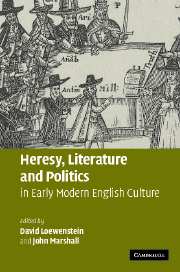Book contents
- Frontmatter
- Contents
- Acknowledgments
- Notes on contributors
- Introduction
- 1 Writing and the persecution of heretics in Henry VIII's England: The Examinations of Anne Askew
- 2 Anabaptism and anti-Anabaptism in the early English Reformation: defining Protestant heresy and orthodoxy during the reign of Edward VI
- 3 “Godlie matrons” and “loose-bodied dames”: heresy and gender in the Family of Love
- 4 Puritanism, Familism, and heresy in early Stuart England: the case of John Etherington revisited
- 5 A ticklish business: defining heresy and orthodoxy in the Puritan revolution
- 6 Thomas Edwards's Gangraena and heresiological traditions
- 7 “And if God was one of us”: Paul Best, John Biddle, and anti-Trinitarian heresy in seventeenth-century England
- 8 The road to George Hill: the heretical dynamic of Winstanley's early prose
- 9 Milton and the heretical priesthood of Christ
- 10 An Historical Narration Concerning Heresie: Thomas Hobbes, Thomas Barlow, and the Restoration debate over “heresy”
- 11 Defining and redefining heresy up to Locke's Letters Concerning Toleration
- 12 “Take heed of being too forward in imposinge on others”: orthodoxy and heresy in the Baxterian tradition
- Index
9 - Milton and the heretical priesthood of Christ
Published online by Cambridge University Press: 20 February 2010
- Frontmatter
- Contents
- Acknowledgments
- Notes on contributors
- Introduction
- 1 Writing and the persecution of heretics in Henry VIII's England: The Examinations of Anne Askew
- 2 Anabaptism and anti-Anabaptism in the early English Reformation: defining Protestant heresy and orthodoxy during the reign of Edward VI
- 3 “Godlie matrons” and “loose-bodied dames”: heresy and gender in the Family of Love
- 4 Puritanism, Familism, and heresy in early Stuart England: the case of John Etherington revisited
- 5 A ticklish business: defining heresy and orthodoxy in the Puritan revolution
- 6 Thomas Edwards's Gangraena and heresiological traditions
- 7 “And if God was one of us”: Paul Best, John Biddle, and anti-Trinitarian heresy in seventeenth-century England
- 8 The road to George Hill: the heretical dynamic of Winstanley's early prose
- 9 Milton and the heretical priesthood of Christ
- 10 An Historical Narration Concerning Heresie: Thomas Hobbes, Thomas Barlow, and the Restoration debate over “heresy”
- 11 Defining and redefining heresy up to Locke's Letters Concerning Toleration
- 12 “Take heed of being too forward in imposinge on others”: orthodoxy and heresy in the Baxterian tradition
- Index
Summary
For more than two hundred years, readers of Milton have sought to identify the theology behind Milton's representation of the Father and Son in Paradise Lost. In the wake of the recent controversy over Milton's authorship of the De Doctrina Christiana, critics have been drawn anew to the question of the way in which Milton's representation of the Son in the epic betrays a specific interest in the contemporary heresy of Socinianism, the anti-Trinitarian theology that dated the creation of the Son to the Incarnation (the Socinian Son is neither coequal or coeternal with the Father), and which confuted all orthodox understandings of the crucifixion as an event that effected either the remission of sins or the reconciliation of man and God. In a recent, splendidly comprehensive overview of the critical history of Milton's engagement with Socinianism, Michael Lieb has shown definitively that Milton, while consistently refusing to identify himself as a Socinian, manages nonetheless to engage and imitate not just the logical rigor but often even the specific arguments of this most recent flowering of anti-Trinitarian theology.
At the same time that Milton's relation to Socinianism has resurfaced as a topic of exploration, a compelling consensus has begun to emerge, or re-emerge, that Milton came to embrace many aspects of the ancient heresy of Arianism. Espousing a higher Christology than its early modern counterpart, Arianism also posited the createdness of Christ, but as Milton does in Paradise Lost, endowed him with an existence in Heaven before his incarnation as the Messiah.
- Type
- Chapter
- Information
- Heresy, Literature and Politics in Early Modern English Culture , pp. 203 - 220Publisher: Cambridge University PressPrint publication year: 2006
- 5
- Cited by



